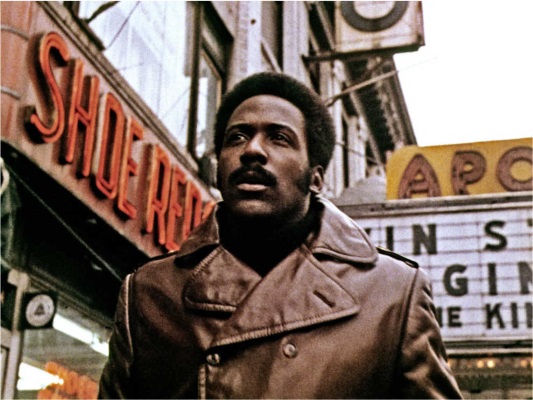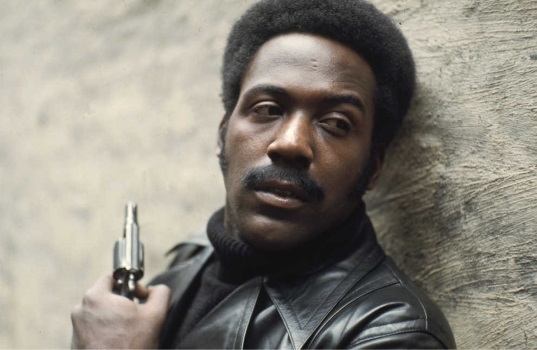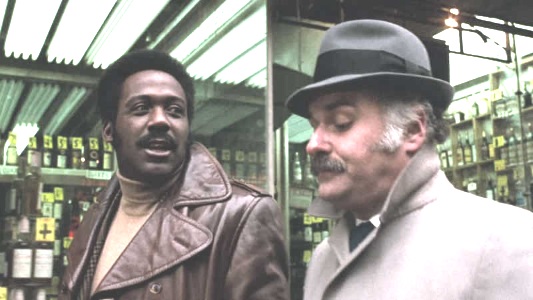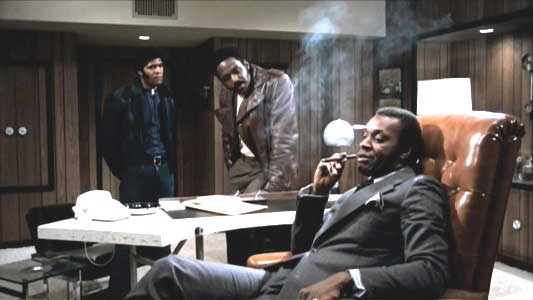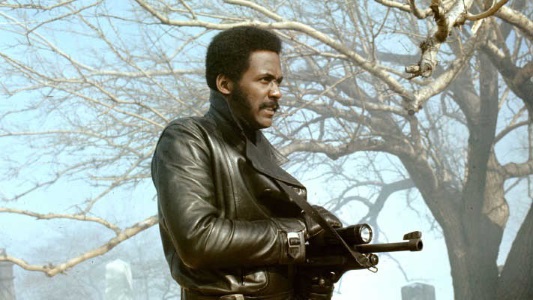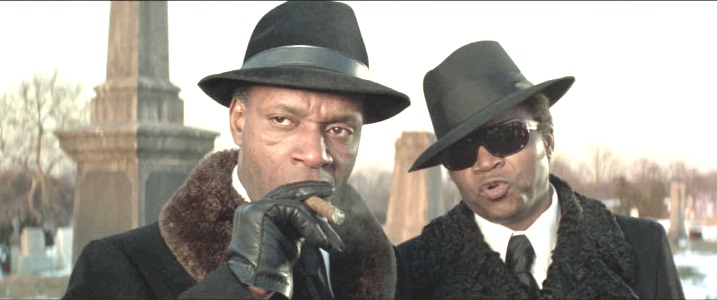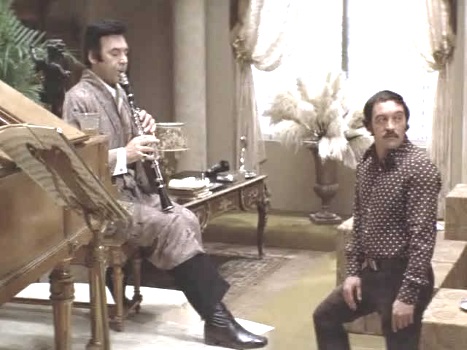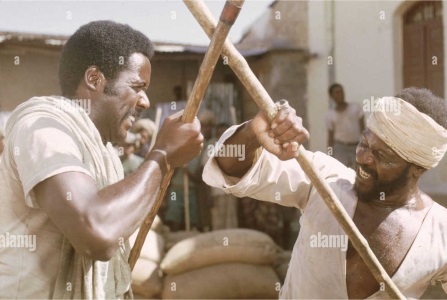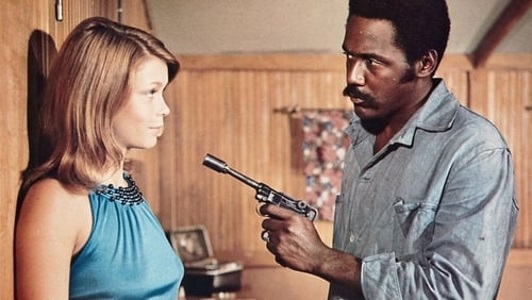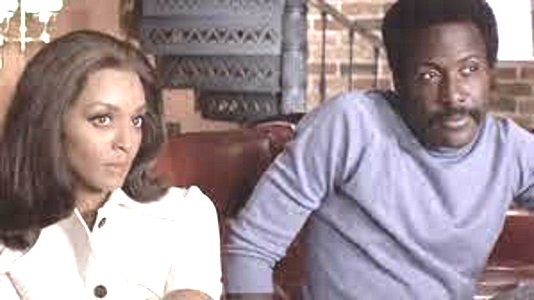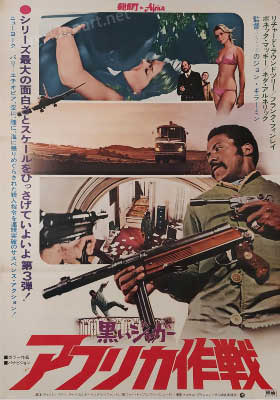The Shaft Trilogy
Shaft
(1971) - 7.5
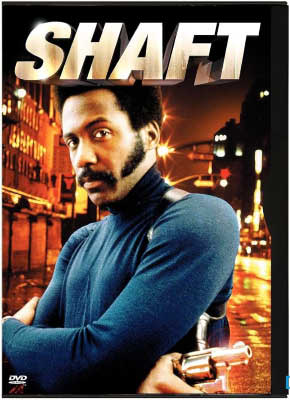
Though it wasn't the first film that became known as Blaxploitation - that
was Sweet Sweetback's Baadasssss Song - Shaft was the film that broke through
at the box office and crossed over to the general audience. Shaft was the
first black action hero. He set the standards that all following black heroes
had to measure up to - confident, cocky, sexual, a fuck you attitude, take
no shit from the white man and simply cool. Having a great theme song didn't
hurt. The film is based on the first Shaft book by Ernest Tidyman who was
to write seven Shaft novels. He also was the main writer of The French Connection
movie script, What surprised me after reading the book recently is that Tidyman
is white. The book is a bit of a narrative mess but he gets the mood right
- he gets NYC right as well - and he gets the black animosity towards the
white establishment and vice-versa right. The film which he helped script
tones down a lot of the racial tensions, the language and the large amount
of homophobia that is sprinkled through the book. One can easily understand
that not making it into the film. But most surprising is that in the film
script, Tidyman made Shaft white. Ya. White. I expect he thought that was
more commercial and that the studio MGM would want that.
But the film was put in the hands of Gordon Parks, a black director with
only one film credit to his name. That was The Learning Tree in 1969 and
he was the first black director for a major studio - Warners. Parks wanted
to stay true to the book and insisted that Shaft be played by a black man
and hired Richard Roundtree for the role. A fine choice obviously but interesting
in that Roundtree had only had a minor role in one previous film but had
lots of theatrical experience. He makes the film. Smooth but not too smooth.
Tough but not too tough. In the opening scene as the camera pans 42nd street
and the movie theater marquees, the famous Isaac Hayes theme song slowly
rolls in as Shaft walks through traffic as if he owns the street. In a sense
he does. Everyone who lives in that milieu knows Shaft. The newspaper guy,
the barbers, the shoeshine man, the junkies needing a fix. They tell him
that two guys from uptown - meaning Harlem - are looking for him.
The film is very faithful to the book until the final fifteen minutes when
they add some action and a few dead bodies. Until then I was surprised at
how few liberties they took with the plot. A couple small ones though
to make Shaft less of a killer. When the two men are in his office and he
fights them, one goes out the window to his death below. In the book, when
he doesn't talk, Shaft picks him up and throws him out the window to entice
the other guy to open up. Later in the film when the mafia thug takes him
to see the kidnapped girl, Shaft holds him in front of him and demands the
girl. In the book as soon as they get to the door, Shaft pulls out his gun
and shoots him in the head. It is kind of a wtf moment. Cold-blooded killing.
We don't usually get that from our heroes and we don't in the film.
Shaft is a private eye and is hired by the top Harlem big man in the rackets,
Bumpy Jonas (Moses Gun) to find his daughter who has been kidnapped but he
says he doesn't know by who. Soon people are trying to kill Shaft. The mafia.
They want Harlem. The book has very little action until a confusing ending
- and the film stays the same until that ending which definitely the film
needed and Roundtree needed to cement his tough guy reputation going forward.
The film made a ton of money and there are two sequels - Shaft's Big Score
in 1972 and Shaft in Africa in 1973. I only wish that the theme song had
played more often - I think the 2000 Shaft used it more liberally. It is
hard to imagine Shaft as a white guy. That would have been an entirely different
film. And who knows if Blaxploitation would have exploded like it did.
Shaft's Big Score
(1972) - 7.0
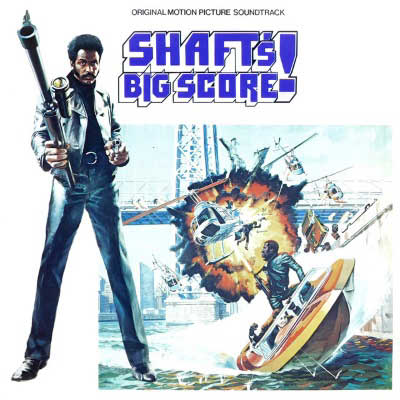
Even before Shaft was released into theaters, MGM gave the go-ahead for a
sequel since they felt so confident it would do well. And it did, making
$13 million on a budget of $500,000. Gordon Parks is back as director
and Ernest Tidyman again wrote the script (but not from one of his books).
Needless to say, Richard Roundtree is back as the titular character. The
general consensus is that the sequel is not the equal of the first film,
but in some ways, I think it is better. It had a budget four times as much
as the first and is clearly better shot with a lot more action. The final
twenty minutes is a terrific set-piece of violence and car/boat/helicopter
chase. It is missing some of the grit and cool of the first film, but it
was still shot in New York City and Shaft is still bedding the women. He
is living on Bleeker Street in a duplex apartment that today would be worth
all the gold in Fort Knox. This one has a more complex and engaging plot
with Shaft getting in the way of three different gangs who all want the numbers
racket in a section of the city.
Shaft is in bed under the blankets that are doing a mambo movement when he
receives a call that he eventually answers. It is an old friend - that is
his sister (Rosalind Miles) sharing the bump and grind with Shaft - and he
tells Shaft that he is in trouble and needs him right away. Trouble is Shaft's
business but before he gets there, the friend is blown up - but not before
hiding $250,000 in a coffin. He ran a funeral parlor. The man's partner Kelly
(Wally Taylor) needs that money to pay off a debt to a mafia type who runs
a club with women dancing and available and a casino in the back. Mascola
wants his money and has his enforcer (Joe Santos - Becker on Rockford) to
get tough when needed. Bumpy (Moses Gunn) is back from the first film and
he sees an opening to expand his business beyond Harlem.
All three gangs want to either use the others or kill them and there is Shaft
trying to help the sister get justice. And a slice of the pie. The cop in
charge of investigating the killing is played by Julius Harris- Live and
Let Die. The film spends time developing the all the characters in the film
- giving them personalities. After years of Rockford, it is hard watching
Santos as a cold-blooded killer but his annoyance at his clarinet playing
satin wearing boss gives him a touch of humanity. Even minor characters such
as the mistress of Kelly is given a nice role and an individuality - and
of course beds Shaft. This misses the iconic score from the first film -
Hayes was asked to do it but wanted too much money - so Parks composed it
but he is no Isaac Hayes. There was another sequel to go - Shaft in Africa.
104-minutes.
Shaft in Africa
(1973) - 6.0
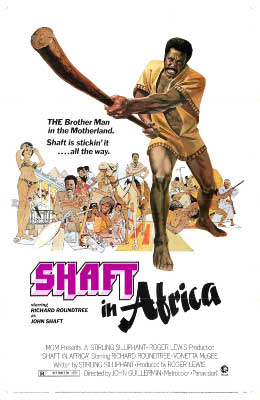
Is he still Shaft, if you take him out of New York City. Yes. Sort of. In
this third film of the Shaft Trilogy, MGM switches director and writer and
sends Shaft from New York to Africa to Paris and he kills a bunch of people
along the way. It is a strange little film full of some unexpected kinky
sexual content and general weirdness. Tidyman who wrote the scripts for the
first two films as well as the Shaft novels was unhappy with how Shaft ended
up in the two films and turned down the opportunity to write this one. They
turned to Stirling Silliphant who had been executive producer on the first
two films and had some fine writing credits on his resume - In the Heat of
the Night and Marlowe. For the director they hired John Guillermin who had
started directing with a number of small British films, then a couple of
Tarzan films, then a few A listed films - The Blue Max and The Bridge at
Remagan and now I guess he was ready to take on the iconic figure of Shaft.
To some degree, this feels more like a Bond film then a Shaft film and at
one point when he is being given a hidden camera and recorder, he tells them
I am not Bond you know. But he could have been. The film barges right into
sexual content as the main villain Amafi (Frank Finlay) is in the back seat
of his car being driven and tells his traveling companion Jazar (Neda Arneric)
"Brighten my day" and she goes down on him. Damn, I can picture all the parents
putting their hands over the eyes of their children. "What is she doing,
mom". "Looking for keys". That is just the beginning of the sexual oddness
and of Jazar. Later on, she asks Shaft, "How long is your cock"? "Shrunk
down to 20-inches". What drugs was Silliphant on? Shaft is kidnapped by a
huge black man with a fighting stick, stripped naked and put in a locked
room with sand covered floors and bright lights turning the room into an
oven. "If you can walk for eight hours Mr. Shaft and survive, we will talk".
It turns out this is an interview for a job for an Emir from Africa. For
a payday of $25,000. And a bonus of the Emir's daughter as a playmate. Forget
the $25,000 thank you, Vonetta McGee (Blacula to this point) is compensation
enough. The job. Stop the slave trade in Ethiopia. Go undercover as a slave
and trace it to the top man in Paris. What could be easier. A few lessons
in stick fighting, geography and language and he is ready. After Vonetta
explains to him that she will soon have female circumcision. "Yes, my clitoris
will be removed". Shaft responds as only Shaft would "Well, first let me
show you what you will be missing". And off to Africa he flies with his stick
that has a camera within.
Of course, he fools no one and they keep trying to kill him all along the
way. Maybe he should not have kept singing "Who's the black private dick
that's a sex machine to all the chicks? Shaft" to all the women he meets
but who can blame him. But they are not very good at the job. The bodies
begin to pile up. Jazar shows up and afterwards tells him "Finally, I have
had sex the way it is supposed to be". What giving oral sex in the back seat
wasn't good for you? The film bombed at the box office and that was the end
of Shaft though Roundtree did appear in a TV show that only lasted seven
episodes. I think I saw it but don't recall a damn thing about it. Probably
no mention of clitorises in that. The Temptations open the film with Are
You Man Enough" which fits in very nicely. So, I guess the answer to can
you take Shaft out of New York City was a resounding no. But it is good fun,
constantly moving with action and excellent camera work in Africa.
